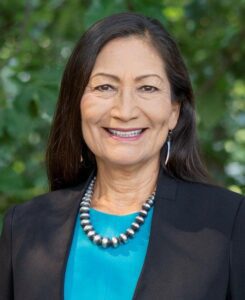Removing derogatory Native names on public lands
Removing derogatory Native names on public lands
WASHINGTON — A new, 37-page guide aims to make it easier for First Nations, grassroots organizations and local leaders across the country to change offensive and derogatory places names on public lands.
“A Guide To Changing Racist and Offensive Place Names in the United States” — co-sponsored by the National Association of Tribal Historic Preservation Officers (NATHPO) and The Wilderness Society (TWS) — delves into the scope of the problem, while also providing a step-by-step tutorial on how to apply to name or rename offensive place names through the U.S. Board of Geographic Names — the official entity responsible for naming lakes, rivers and mountains in the United States. The free guide also provides advice for engaging Tribes, local communities and state naming authorities.
“We are grateful for the opportunity to co-sponsor ‘A Guide to Changing Racist and Offensive Place Names in the United States,’” said NATHPO Executive Director Valerie Grussing. “NATHPO empowers Tribal preservation leaders protecting culturally important places that perpetuate Native identity, resilience, and cultural endurance. Words have power and representation matters. Having names for places that reflect their relationship and meaning to our nation’s first peoples, rather than perpetuate the wounds of colonization, is a critical step in processes of healing and reconciliation.”
Anyone can propose to name or rename a geographic feature in the United States. In 1974, the United States officially changed all places that used a derogatory term for Japanese Americans. In 2015, after 119 years as Mount McKinley, the largest mountain in North America was renamed Denali to reflect the land’s Indigenous origins. In 2021, Department of Interior Secretary Deb Haaland announced plans to ban any geographic place name using a sexual and racial slur targeting Native American females.
Despite these examples of progress, there are still thousands of place names in the United States that are offensive, disrespectful of Indigenous peoples and their cultures, or brazenly honor members of the Confederacy. NATHPO and TWS hope the guide will inspire grassroots renaming efforts across the country in order to begin creating public lands that reflect a more accurate history and that show respect to all people.
The guide was released at NATHPO’s 22nd Annual National Tribal Preservation Conference. The theme of this year’s conference is unity and healing.
“Place names must be equitable and just, honor cultural diversity, and advance dignity for all people,” said Paul Spitler, Senior Legislative Policy Manager for The Wilderness Society. “This guide will help people remove racist relics and replace them with new names that celebrate the diversity of our nation.”
The guide outlines which place names can be changed (rivers, lakes, mountains) and which cannot (wilderness, national forests, cities and towns) by the U.S. Board of Geographic Names, the federal agency responsible for names of geographic features. It gives an overview of the federal renaming process, delves into some of the sideboards and policies the board must follow and provides insights into how the board makes decisions.
“Removing racist place names is a crucial step towards honoring Indigenous peoples across the country and changing the narrative about who Native people are today, “ said IllumiNative Chief Impact Officer Leah Salgado. “These racist names disrespect Native nations and Natives peoples- we must move forward with names that reflect the sacred relationship between our relatives and the land. Names that celebrate our relatives who continue to steward these lands is a step toward justice.”
An example of a local effort to change place names on public lands is in Colorado where there’s a campaign to change the name of Mount Evans — named after a former Colorado governor who facilitated the Sand Creek Massacre, one of the worst massacres of Native American men, women, and children in American history.
At the federal level, Secretary Haaland announced in November 2021 banning all names that use a derogatory term for Native American women, of which there are more than 650 places across the country with most of them touching down in California. Last week, a 60-day public comment period commenced to provide feedback on replacement names for these sites. Tribal listening sessions will be held at the end of March and public comment is accepted until April 24.
Haaland’s announcement also established an advisory committee to identify and recommend renaming other offensive and hurtful place names across the country. In addition, the Reconciliation in Place Names Act, introduced by Sen. Elizabeth Warren (D-Mass.) and Rep. Al Green (D-Texas), is moving through both the U.S. House and U.S. Senate and would also create an advisory committee to address derogatory place names on public lands.
The post Removing derogatory Native names on public lands first appeared on Native Sun News Today.

